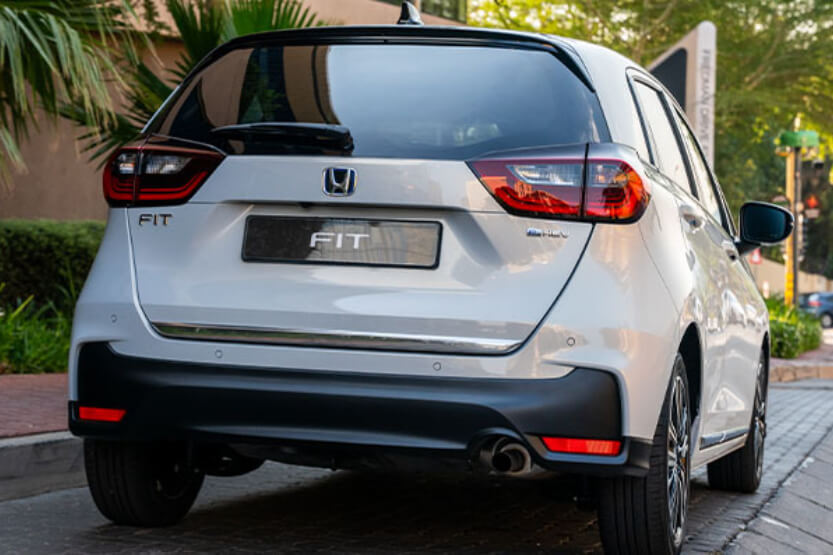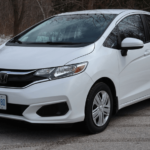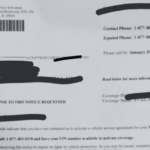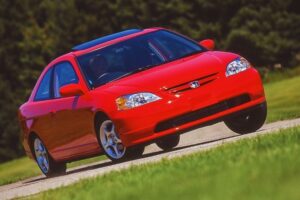The Honda Fit, a subcompact hatchback, has been discontinued in the United States after the 2020 model year.
The decision to discontinue the Fit in the US was a result of falling demand within the subcompact segment. The Fit was initially introduced in 2001 and was known for its fuel efficiency and surprising room for its size.
Honda’s decision to discontinue the Fit has left many car enthusiasts disappointed. The Fit was a benchmark entry-level vehicle that was popular among first-time car buyers and those who needed a fuel-efficient car for daily commutes.
Despite the Fit’s popularity in other parts of the world, Honda has decided not to bring the new global version of the Fit to the US. As a result, the Fit has been removed from Honda’s US lineup, leaving the Honda Civic as the brand’s smallest car in the US market.
History of the Honda Fit

The Honda Fit, also known as the Honda Jazz in some markets, has been in production since 2001. It is a subcompact car that has been marketed worldwide and manufactured at ten plants in eight countries.
The Fit has gone through four generations of evolution, each with its unique features and improvements.
Evolution Across Generations
The first-generation Honda Fit was introduced in 2001 and was available in both a 5-door hatchback and a 4-door sedan. The second-generation Fit was launched in 2007 and featured a more spacious interior, improved fuel efficiency, and better handling.
The third-generation Fit was introduced in 2013 and featured a more aggressive design and a more powerful engine. The fourth-generation Fit was launched in 2019 and featured a sportier look, improved fuel efficiency, and advanced safety features.
Global Presence and Market Performance
The Honda Fit has been a global success, with sales in over 160 countries. It is considered a supermini in the United Kingdom, a subcompact car in the United States, and a light car in Australia.
The Fit has been particularly popular in Japan, where it has been the best-selling car for several years. In the United States, the Fit has been a popular choice for city dwellers and those seeking a fuel-efficient car.
The Final Year: 2020 Model Year
Despite its popularity, Honda announced in 2020 that it would be discontinuing the Honda Fit in the United States after the 2020 model year. Honda cited slow sales as the reason for dropping the Fit, with sales down 19 percent to just 13,887 units in 2020.
In 2019, Honda sold 35,414 units of the Fit, compared to the HR-V’s 99,104 units sold. The fourth-generation Fit was launched in 2019, but Honda took too long to redesign the Fit, rarely advertised it, and its sales numbers had been slumping.
Reasons for Discontinuation
Shift in Consumer Preferences
One of the reasons for the discontinuation of the Honda Fit is the shift in consumer preferences. According to GearShifters, consumers are now more interested in crossovers and SUVs, which offer more space and versatility than subcompact cars like the Fit.
As a result, Honda has decided to focus on producing more crossover and SUV models to meet the changing demands of consumers.
Sales Decline and Market Trends
Another reason for the discontinuation of the Honda Fit is the decline in sales and market trends. As reported by Car and Driver, the sales of the Fit have been declining in recent years.
In 2019, Honda sold only 35,414 units of the Fit, compared to the HR-V’s 99,104 units. In 2020, sales are down 19 percent to just 13,887 units. The decline in sales is due to the increasing popularity of crossover and SUV models in the market.
Production and Cost Factors
According to Auto Zonic, production and cost factors also played a role in the discontinuation of the Honda Fit. The production of small cars like the Fit requires a significant investment in tooling and equipment, which can be expensive.
Additionally, the cost of producing subcompact cars has been increasing due to the implementation of stricter safety and emission regulations. As a result, Honda has decided to focus on producing more profitable models that offer higher profit margins.
In conclusion, the discontinuation of the Honda Fit was due to a combination of factors, including the shift in consumer preferences, declining sales, and production and cost factors. Honda has decided to focus on producing more profitable models that meet the changing demands of consumers.
Impact on Dealers and Consumers

Inventory and Availability
The discontinuation of the Honda Fit has affected both dealers and consumers in terms of inventory and availability. As the model was one of the entry-level Hondas, it was popular among first-time car buyers and those looking for a fuel-efficient vehicle.
With the discontinuation of the model, dealerships are left with limited inventory, and consumers looking for a Fit may have to settle for a used one or consider other similar models.
According to CarsDirect, the Honda Fit is nearly sold out, and major new car listing sites show less than 400 Fits left in stock in the U.S. As a result, dealerships are no longer receiving new shipments of the Fit, and the limited inventory is expected to dwindle quickly.
Resale and Aftermarket
The discontinuation of the Honda Fit may also affect the resale value of the model. As the Fit becomes rarer, it may increase in value as a collector’s item. However, it is more likely that the value will decrease due to the lack of demand for the model.
In addition, the discontinuation of the Fit may also affect the availability of aftermarket parts and accessories, which could make repairs more difficult and expensive for Fit owners.
It is important to note that while the discontinuation of the Honda Fit may be disappointing for some consumers and dealers, it is a business decision made by Honda due to low sales.
As GearShifters reports, the Fit’s sales had been slumping, and Honda makes more money from the HR-V, which has a base price of $22,040 as opposed to the Fit’s $17,145.
Overall, the impact of the Honda Fit’s discontinuation will vary for each individual dealer and consumer. While some may be affected by the limited inventory and availability, others may not be affected at all.
It is important for consumers to consider their options and research similar models before making a purchase.
Technical Specifications
The Honda Fit was a subcompact car that was manufactured and marketed by Honda since 2001 over four generations. The car was known for its practicality, reliability, and fuel efficiency. In this section, we will look at the technical specifications of the Honda Fit.
Performance and Fuel Economy
The Honda Fit was available with either a manual transmission or a continuously variable transmission (CVT). The manual transmission was a 6-speed gearbox that provided a sporty driving experience, while the CVT offered smooth and efficient acceleration.
The car was powered by a 1.5-liter VTEC four-cylinder engine that produced 130 horsepower and 114 lb-ft of torque. The engine was known for its efficiency and had a combined fuel economy rating of 36 mpg for the CVT and 31 mpg for the manual transmission.
Interior and Space Efficiency
The Honda Fit was designed to maximize interior space efficiency. The car had a spacious cabin that could comfortably seat up to five passengers.
The rear seats could be folded down to create more cargo space, and the front passenger seat could also be folded down to accommodate longer items. The car also had a low cargo floor, making it easy to load and unload heavy items.
Safety Features and Honda Sensing
The Honda Fit was equipped with a range of safety features to ensure the safety of its passengers. The car had six airbags, anti-lock brakes, stability control, and a rearview camera.
The car was also available with Honda Sensing, a suite of advanced safety features that included forward collision warning, automatic emergency braking, lane departure warning, and adaptive cruise control. Honda Sensing was standard on the higher trim levels of the car.
In conclusion, the Honda Fit was a practical and efficient subcompact car that offered a range of features and options to its customers.
The car was known for its reliability, fuel efficiency, and spacious interior. Despite its discontinuation in the US market, the car remains a popular choice for many drivers around the world.
Alternatives to the Honda Fit

The Honda Fit has been discontinued in the US, leaving many car buyers searching for alternatives in the subcompact segment. Luckily, there are several options available that offer similar features and functionality. In this section, we will explore some of the top alternatives to the Honda Fit.
Competitors in the Subcompact Segment
One of the most popular competitors to the Honda Fit is the Toyota Yaris. The Yaris offers a spacious and comfortable interior, excellent fuel economy, and a smooth ride. It also comes with a long list of standard features, including a touchscreen infotainment system, Apple CarPlay, and Android Auto.
Another strong contender is the Mazda2. While it may not be as well-known as some of the other options on this list, the Mazda2 offers a fun and sporty driving experience, along with a stylish and well-designed interior.
It also comes with a long list of standard safety features, including blind-spot monitoring and rear cross-traffic alert.
For those interested in a more affordable option, the B-Spec segment offers several choices, including the Nissan Versa and the Kia Rio. While these vehicles may not offer the same level of refinement and features as some of the other options on this list, they are still solid choices for those on a budget.
Honda’s Lineup Alternatives
For those who are loyal to the Honda brand, there are several options available within the automaker’s lineup. The Honda HR-V is a subcompact crossover that offers a spacious and versatile interior, along with excellent fuel economy and a smooth ride.
It also comes with a long list of standard features, including a touchscreen infotainment system, Apple CarPlay, and Android Auto.
If you’re looking for something a bit larger, the Honda Civic and Accord are both excellent choices. While they may not be as small and nimble as the Fit, they offer a spacious and comfortable interior, along with a long list of standard features and excellent fuel economy.
They are also both known for their reliability and resale value, making them solid long-term investments.
Overall, while the discontinuation of the Honda Fit may be disappointing for some, there are still plenty of excellent alternatives available in the subcompact segment. By considering factors such as price, features, and driving experience, car buyers can find the perfect vehicle to meet their needs.
To Summarize
The Honda Fit, a subcompact hatchback, has been discontinued in the United States market after the 2020 model year. The decision to discontinue the model was made due to its low sales performance, as the Fit sold only 13,887 vehicles in 2020, down 19% from the previous year GearShifters.
Honda has not announced any plans to replace the Fit with a similar model in the United States market. However, the company has unveiled a new global version of the Fit, which will be sold in other markets but not in the United States Car and Driver.
The discontinuation of the Fit has disappointed many of its fans, who appreciate the car’s practicality, versatility, and fuel efficiency. The Fit was also known for its spacious interior, which could accommodate tall passengers and cargo with ease.
In summary, the Honda Fit has been discontinued in the United States due to its low sales performance, and Honda has not announced any plans to replace it with a similar model. Despite its discontinuation, the Fit remains a popular choice for its practicality, versatility, and fuel efficiency.


![Honda Brake Fluid [What You Need to Know] Honda Brake Fluid](https://roadsumo.com/wp-content/uploads/2022/02/Honda-brake-fluid-150x150.jpg)






